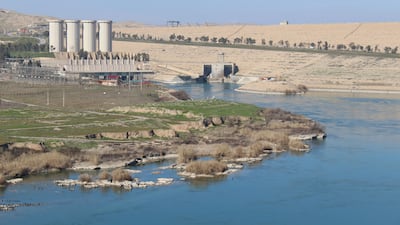Italy is providing private funding for the repair of Iraq's largest dam, which has developed structural flaws after years of conflict.
The Mosul Dam, on the Tigris River about 50km from Mosul, provides power and water to many areas in Iraq's north.
Since it was built in 1980, it has required regular maintenance involving injections of cement on leaking areas in a process called grouting.
The dam was briefly seized by the extremist group ISIS in 2014, leading to a lapse in maintenance that weakened already flawed structure.
Fears grew that the group would blow it up and submerge Mosul and other downstream cities including Baghdad, killing hundreds of thousands of people.
Under a $300 million contract funded by the World Bank, an Italian company called Trevi carried out maintenance and repair works in 2016.
The project ended in 2019. But Italy's ambassador to Iraq, Maurizio Greganti, says his country has provided private funding to maintain the dam and to train Iraqis.
The company worked on preventing the foundations of the dam from plunging deeper underground, he said.
The Italian Agency for Development Co-operation, which is funded by the Italian government, is providing assistance to the Iraq Ministry of Water Resources with skills training, safety system advice and technology transfer.
The agency and the UN Industrial Development Organisation have been working together with the ministry.
"The Italian government funded the rehabilitation of the Mosul Dam and made a great achievement in relation to this dam, as the Italian Trevi company carried out this work," Mr Greganti said on Tuesday.
"Proper management of dams and reservoirs will have a huge impact on the livelihood of many Iraqis and Italy is proud to have contributed."
A collapse in the dam would send water down the heavily populated Tigris valley.
Mr Greganti said his government also helped establish the National Dam Safety Department in the Ministry of Water Resources.
The dam's reservoir can store up to 11 billion cubic metres of water and produces hydropower, generating an average of 580 megawatts of energy a day.
But Azzam Al Wash, an Iraqi-American hydraulic engineer who was an adviser on the Mosul Dam, told The National that it cannot be fixed.
"Iraq is better off getting into an agreement with Turkey on leasing Ilisu dam, which has the same capacity and less evaporation and percolation losses," Mr Al Wash said.
The country has suffered severe environmental degradation and water scarcity as a result of climate change, alarming levels of pollution and mismanagement.
Several Turkish dams on the Tigris and Euphrates rivers built over the past 50 years have made water scarcity problems worse.








